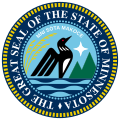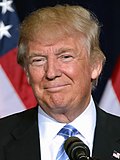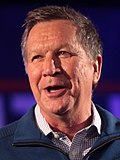| | |||||||||||||||||||||||||||||||||||||||||||||||
| |||||||||||||||||||||||||||||||||||||||||||||||
| |||||||||||||||||||||||||||||||||||||||||||||||
Minnesota results Marco Rubio 30-40% 40-50% Ted Cruz 30-40% Donald J. Trump Tie | |||||||||||||||||||||||||||||||||||||||||||||||
| Elections in Minnesota |
|---|
 |
The 2016 Minnesota Republican presidential caucuses were held on March 1, 2016, as part of the Republican Party's series of presidential primaries. This event was part of the Super Tuesday elections, the day on which the greatest number of states hold primaries and caucuses. The Democratic Party held its Minnesota caucuses on the same day.
Contents
The results were notable because it was the only state that was won by Florida senator Marco Rubio. He won 36.5% of the popular vote and received 17 national delegates. He had a particularly strong showing in the 3rd, 4th, and 5th congressional districts. [1] Rubio's success in Minnesota followed a substantial campaigning effort in the state, including a rally in Anoka County on the day of the caucus.
Minnesota was also one of the rare states where then-candidate Donald Trump finished in third place, behind both Rubio and Texas senator Ted Cruz. Analysts attributed Rubio's success in Minnesota to several factors, including the state's caucus format, which tends to favor candidates with strong organizational structures and active, engaged supporters. Additionally, the high proportion of college-educated voters in Minnesota was seen as favorable to Rubio, who tended to perform well with this demographic. [2]
The Minnesota caucus experienced a high voter turnout, with reports of many attending a caucus for the first time. This surge led to organizational difficulties, such as overcrowding and ballot shortages. In some locations, volunteers struggled to manage the influx of participants. [3]






